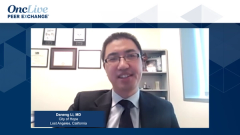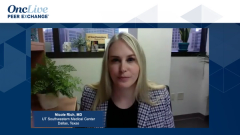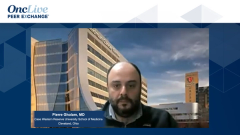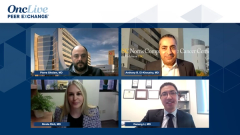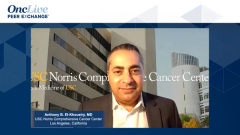
Is There a Role for Liver-Directed Therapy in Advanced HCC?
An expert gastroenterologist, Dr Pierre Gholam, discusses the phase 3 LAUNCH trial and shares insight on the potential role of liver-directed therapy in the treatment of advanced hepatocellular carcinoma.
Episodes in this series

Anthony B. El-Khoueiry, MD: Before we wrap up this segment, I’d like to go back to Dr Gholam and talk about whether there’s a role for liver-directed therapy in patients with advanced HCC [hepatocellular carcinoma]. We saw a bit of data from the LAUNCH study at ASCO GI [American Society of Clinical Oncology Gastrointestinal Cancers Symposium]. Let’s have a minute or 2 on this topic.
Pierre Gholam, MD: Sure. Multimodality therapy, as some of us like to call it, whether in a sequential or initial planned manner, has unfortunately had a fairly checkered past. The first serious attempt at trying to see whether this increments benefit without the expense of adverse effects and toxicity was the SPACE trial over a decade ago. This was a much maligned study, but it taught us 1 good lesson. If you allow 30, 40, or 50 centers to implement locoregional therapy at their discretion, you get a terrible amount of heterogeneity, which renders interpretation of results about impossible. That has been an area that has plagued this field for a while.
We’ve reached some degree of standardization of locoregional therapy to the point where we might be able to glean better understanding of what combination therapy might achieve. But historically, this has remained somewhat limited in scope. We have a study called SOCRATES from a few years ago, and a study called SORAMIC, which was also a multicenter study from primarily German and Swiss centers. Those have all been negative.
At ASCO GI, we saw data from the LAUNCH study, and we owe it to this audience to highlight this somewhat of an outlier study. This is a multicenter Chinese study out of Guangzhou, where folks basically enrolled a bunch of patients in an open-label, phase 3 trial that compared lenvatinib [Lenvima] in combination with transarterial chemoembolization [TACE]—both DEB [drug-eluting bead]–TACE and conventional TACE—vs lenvatinib alone. At the end of follow-up from this study of about 340 patients, there was a significant and somewhat unusual overall survival benefit of 17.8 months for the combination vs 11.5 months for lenvatinib alone. Not surprisingly, it was also associated with some PFS [progression-free survival] improvement.
Does this mean that the way forward is the combination of a TKI [tyrosine kinase inhibitor] and locoregional therapy for the treatment of BCLC-C [Barcelona clinic liver cancer-stage C]? I forgot to mention that important detail—HCC at fairly advanced disease. I think not. We’ll get more data on this that might be more immediately relevant to our practice through a study combining atezolizumab [Tecentriq]/bevacizumab [Avastin] with TARE, transarterial radioembolization. This is a phase 2 study comparing this combination to atezolizumab/bevacizumab alone that our good friend and colleague Dr Ruth He [Georgetown University Medical Center] is leading. It hopefully should report in the next 18 months. But for now, this isn’t in any way practice-changing. It’s interesting and I look forward to the rest of the results of this.
Anthony B. El-Khoueiry, MD: Very nicely summarized. Thank you very much.
Transcript Edited for Clarity


